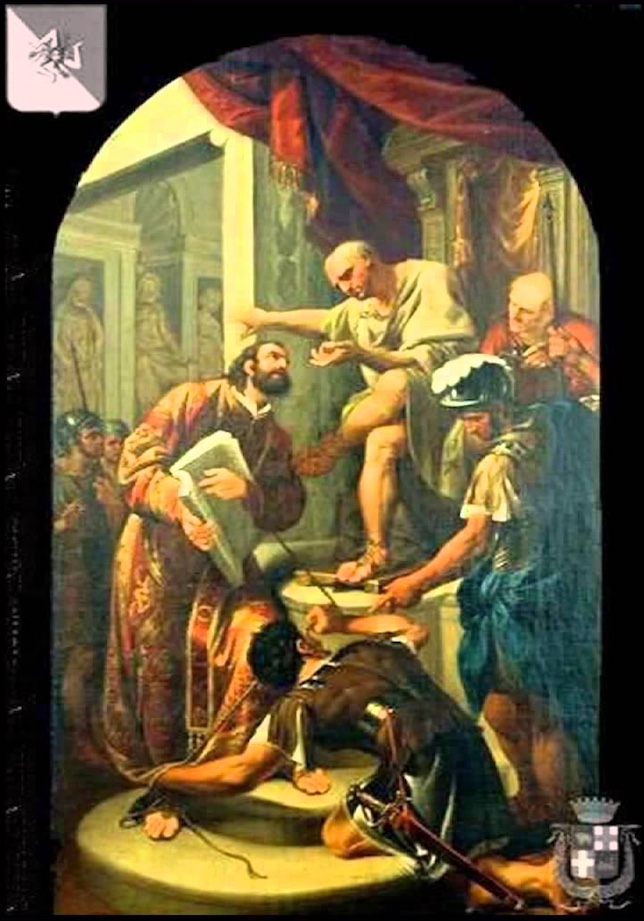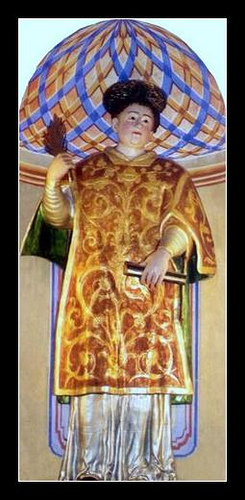On August 12, 304 A.D., during the persecution of Diocletian at Catania, in Sicily, a deacon named Euplius was arrested for owning and reading a copy of the Gospels. He had been reading and explaining the Gospels to a gathered crowd. He was brought to the governor’s hall. He staunchly professed his faith. Standing on the outside of the curtain of the governor’s audience chamber, Euplius cried out: “I am a Christian, and shall rejoice to die for the name of Jesus Christ.” The governor, Calvisian/Calvinianus/Calvinian, heard him and ordered that he who had made that outcry should be brought in, and presented before him. With the Book of the Gospels, Euplius was led before the governor. Maximus, a friend of the governor’s who was present, said to Euplius, “You ought not to keep such writings, contrary to the edicts of the emperors.”
The governor queried Euplius whether he brought the text from his house, or carried them about with him. Euplius replied he had no house and carried the Scripture with him at all times. “But why,” said the judge, “did you not give up those writings as the emperors have commanded?” “Because I am a Christian. I will sooner die than deliver them. In them is eternal life, which is lost by him who would betray what God has entrusted to his keeping.”
Euplius was commanded to read from the Scriptures. The saint read the passage: “Blest are they who suffer persecution for justice’s sake, for theirs is the Kingdom of Heaven.” (Mt 5:10) Euplius then read the passage: “If anyone will come after Me, let him deny himself and take up his cross and follow Me.” (Mt 16:24/Lk 9:23)
Questioned by the governor as to what this meant, the youth replied: “It is the law of my Lord, which has been delivered to me.” Calvisian asked: “By whom?” Euplius replied: “By Jesus Christ, the Son of the Living God.” This infuriated the governor, and he ordered that Euplius be led away to be tortured. At the height of his torment Euplius was asked if he still persisted in Christianity. The saintly youth answered: “What I said before, I say again: I am a Christian and I read the Sacred Scriptures.” The martyr said, while he was tormented: “I thank You, O Lord Jesus Christ, that I suffer for Your sake: save me, I beseech You.”
Calvisianus said: “Lay aside your folly; adore our gods, and you shall be set free.” Euplius answered: “I adore Jesus Christ; I detest the devils. Do what you please; add new torments; for I am a Christian. I have long desired to be in the condition in which I now am.” After the executioners had tormented him a long time, Calvisianus bade them desist, and said: “Wretch, adore the gods; worship Mars, Apollo, and Æsculapius.” Euplius replied: “I adore the Father, Son, and Holy Ghost. I worship the Holy Trinity, besides whom there is no God.” Calvisianus said: “Sacrifice, if you would be delivered.” Euplius answered: “I sacrifice myself now to Jesus Christ, my God. All your efforts to move me are to no purpose. I am a Christian.” Then Calvisianus gave orders for increasing his torments.
While the executioners were exerting their utmost in tormenting him, Euplius prayed: “I thank You, my God; Jesus Christ, succor me. It is for your name’s sake that I endure these torments.” This he repeated several times. When his strength failed him, his lips were seen still to move, the martyr continuing the same or the like prayer with his lips when he could no longer do it with his voice. The governor realized that he would never give up his faith, and ordered him to be beheaded.
The executioners hung the book of the Gospels, which the martyr had with him when he was seized, about his neck, and the public crier proclaimed before him: “This is Euplius the Christian, an enemy to the gods and the emperors.” Euplius continued very cheerful, and repeated as he went: “I give thanks to Jesus Christ, my God. Confirm, O Lord, what You have begun in me.” When he had come to the place of execution, he prayed a long time on his knees, and once more returning thanks, presented his neck to the executioner, who cut off his head. The Christians carried off his body, embalmed and buried it.
St. Euplius died April 29, 305 A.D., praising God all the while.

-Church of St Euplius, Moscow, 1881.
“The Pope!??? How many divisions does he have?”
-Josef Stalin, General Secretary of the Communist Party of the former Soviet Union, said sarcastically to Pierre Laval in 1935, in response to being asked whether he could do anything with Russian Catholics to help Laval win favor with the Pope, to counter the increasing threat of Nazism; as quoted in The Second World War (1948) by Winston Churchill vol. 1, ch. 8, p. 105.
“The one with the most saints, wins!”
-Dr. Peter Kreeft, Boston College
Love,
Matthew



